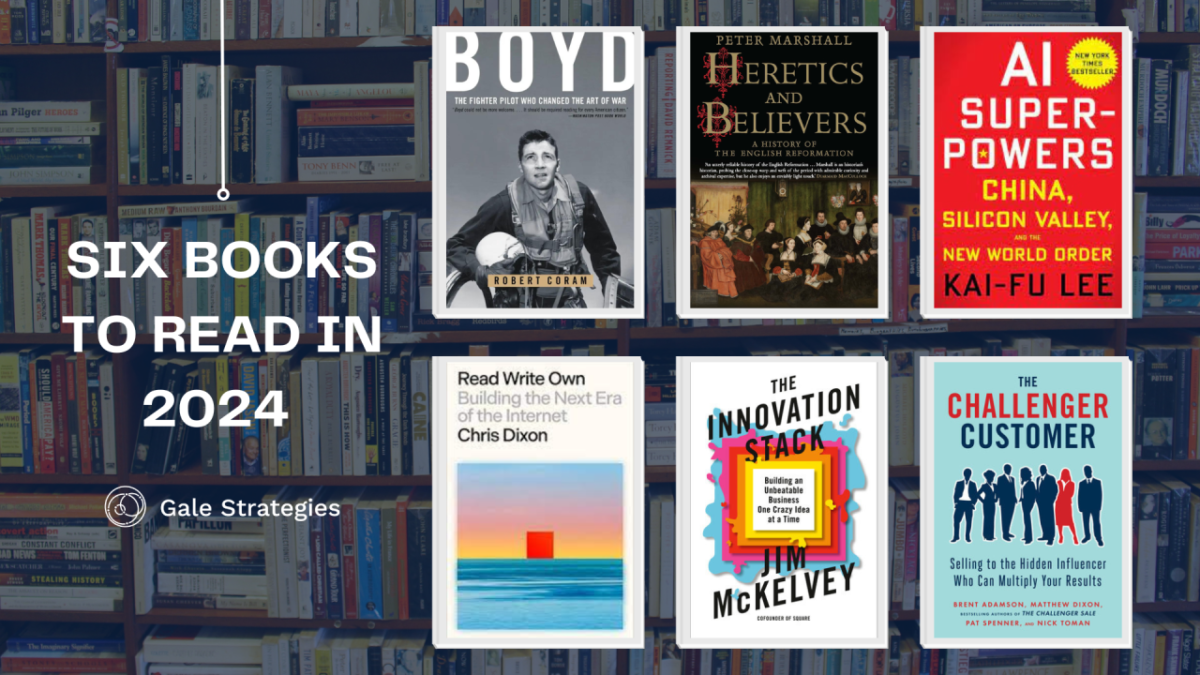If you couldn’t already tell, at Gale Strategies we love books. And not just books about marketing and PR. No, we love all books. It’s part of the Gale Strategies way – taking what we read and fitting it into a framework of ideas that we incorporate into what we do.
Interested in what we have read? Below are the six books we think you should take a look at in 2024 and the lessons we learned from them.
To start, here are two books we’ve referenced recently to clients (and if you follow Chris Gale’s account you’ll already know one):
Boyd by Robert Coram
- Our summary – A U.S. Air Force fighter pilot concludes the economic buyers at the Pentagon are buying weapon systems that serve their interests, but fail the end users (the pilots and soldiers on the front line).
- Lesson – Yes, the economic buyer needs you to show that you’re listening to them… but you must pay attention to the end user and strategically advocate for them, even if the economic buyer doesn’t want to hear it.
Heretics and Believers by Peter Marshall
- Our summary – The English monarchy picks winners and losers between Pope and protestants without getting their heads chopped off. (FYI, this is a detailed church history first and foremost, so if that’s not what you’re into, you’ll need some patience.)
- Lesson – Pay attention to the role of book printing, book smuggling, and lay language in this one. One side might have the power of the state and tradition on their side, but if you’re on the side of restricting access to information and you’re not speaking everyone’s language, you’re inherently in an untenable position. Again, don’t ignore the economic buyer, but the end user is where you win or lose at the end of the day.
Now, to add to those, here’s two books we think uncover blind spots in the industries we serve today:
AI Super Powers by Kai-Fu Lee
- Our summary – While Europeans and Americans have been fretting about AI safety and privacy, China’s tech industry appears to have near unfettered access to the population’s enormously detailed data and those of us on the outside are going to turn around and be surprised how far we’ve been left behind.
- Lesson – If you’re writing about AI and you’re not talking about the very different conditions in which it is developing in China, you’re not really talking about AI. Also, for the record our entry point was Rebecca Fannin’s Tech Titans of China.
Read, Write, Own by Chris Dixon
- Our summary – The internet has essentially become a set of feudal estates in which the entrepreneurial bourgeois and serfdom class of users don’t have any real ownership. Blockchains represent the next environment where entrepreneurs can break free from the gravitational pull of today’s internet magnates, and users/serfs can renegotiate their position.
- Lesson – We find it useful to read this after reading AI Super Powers given that Kai-Fu Lee tries to work out what to do about everyone who will be unemployed by AI, and looks for something better than a basic wage. Chris Dixon’s logic suggests blockchain networks may solve Lee’s problem given AI would need to negotiate with the sources of labor and compensate them for the work that they’re doing.
And finally here’s two books we just keep coming back to over and over:
The Innovation Stack by Jim McKelvey
- Our summary – There’s a whole lot of great books on the entrepreneurial process, but if we could only recommend one, this is it. McKelvey uses the examples of his own co-creation, Square, as well as the origins of Bank of America and Southwest Airlines to illustrate how big businesses come out of serving the hard to serve parts of the market incumbents ignore.
- Lesson – Don’t try to be the best at serving an already addressed market. Find some folks who everyone else doesn’t think are worth the time. And everything that makes those folks hard to serve, will also make it hard for anyone to compete with you once you work out solutions. Love the problems.
The Challenger Customer by Brent Adamson, Mathew Dixon, Pat Spenner and Nick Toman
- Our summary – Don’t sell what enterprise customers want. Sell them a better solution to their problems, and big bonus points if nobody else thinks it’s a good idea.
- Lesson – If you want to know why Gale Strategies clients succeed in their markets, it’s because we gravitate toward leaders who are just obstinate enough to already be inclined toward this proven method of winning profitable revenue when everyone else is coming up empty. It’s not an easy process, but going back to The Innovation Stack, if it were, everyone would be doing it, and then there’s no point in you being in that market.
